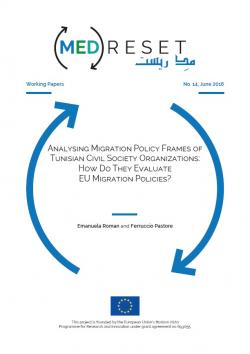Analysing Migration Policy Frames of Tunisian Civil Society Organizations: How Do They Evaluate EU Migration Policies?
Based on information gathered through extensive fieldwork in Tunisia, this paper analyses how Tunisian civil society actors represent the Mediterranean space, how they frame migration in general and how they frame specific migration-related policy issues and the factors and actors affecting them. The paper further investigates how Tunisian stakeholders evaluate existing policy responses, focusing in particular on EU policies and cooperation initiatives in this field. Finally, the paper outlines possible policy implications, future developments and desirable improvements with regard to EU–Tunisia cooperation in the field of migration.
-
Details
Rome, IAI, June 2018, 28 p. -
In:
-
Issue
Working Paper 14
Introduction
1. Fieldwork
1.1 Fieldwork in Tunisia
1.2 Second Round of Interviews with Tunisian Stakeholders
2. A Qualitative Analysis of Stakeholders’ Frames in the Area of Migration and Mobility
2.1 The Representation of the Mediterranean Space
2.2 Framing Migration within a Broader Policy Context
2.3 Framing Migration-related Policy Issues and Priorities
2.3.1 Tunisian Emigration to Europe
2.3.2 Refugees and Right to Asylum in Tunisia
2.3.3 Sub-Saharan Immigration to Tunisia
2.4 Framing the Factors and Actors Affecting Migration-related Policy Issues
2.4.1 Tunisian Emigration to Europe
2.4.2 Refugees and Right to Asylum in Tunisia
2.4.3 Sub-Saharan Immigration to Tunisia
2.4.4 Regional Cooperation and External Actors
2.5 Evaluating Existing Policy Responses and Possible Alternative Solutions
2.5.1 Evaluating the European Approach to EU–Tunisia Relations and Cooperation in the Area of Migration
2.5.2 Evaluating Specific EU–Tunisia Migration Cooperation Policies
3. Policy Implications for Euro-Mediterranean Cooperation in the Field of Migration and Mobility
References
Annex: List of Interviews



